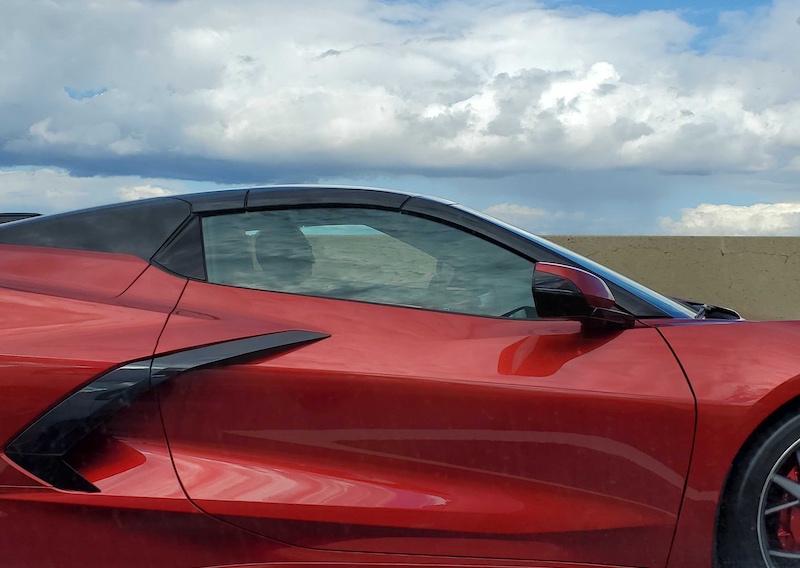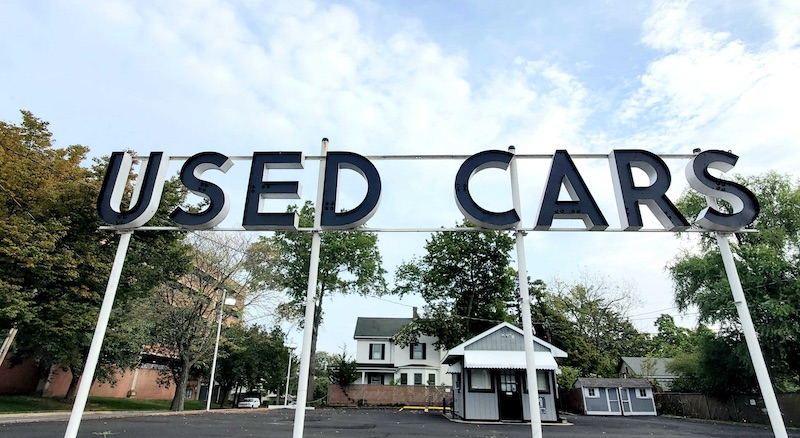Just bought a new car? Congrats! Before you drive your new wheels off the lot, you’ll probably need proof of insurance. So what comes first: the policy or the car?
If it’s been a while since you’ve bought a car, or it’s your first time buying a car, you probably aren’t sure. What about an insurance policy for a used car? We don’t expect you to have all the answers, but we’re here to fill you in on everything you need to know.
The basics of car insurance
Before you start getting car insurance quotes for your new car, it’s smart to brush up on your car insurance coverage basics.
Most states set minimum levels for car insurance coverage, but the amount and type of coverage you select will probably be higher for a new car.
Not all coverage options are required. Your policy is actually a collection of different coverages, all of which kick in under different circumstances. With Lemonade Car, you can easily customize your plan.
In nearly every state, drivers are required to carry a bare minimum of insurance—generally that’s liability coverage, which will help pay for damages or injuries you cause to another person or driver, or their property.
But liability coverage doesn’t extend to damages to your own car, so you’ll likely want to explore additional coverages.
Let’s break down some of the coverage options you’re likely to encounter:
Collision coverage
Hit another car? If you’ve been in a collision, this coverage pays for the repairs to your vehicle. Collision coverage kicks in for all kinds of crashes where your car sustains damages.
Comprehensive coverage
Comprehensive coverage pays for repairs from damage caused by things you can’t control, like weather events, theft and vandalism, hitting an animal, falling objects, and fire.
Temporary transportation coverage
You’re still going to need to get around if your car is in the shop. Temporary transportation coverage reimburses you for public transportation, a rental, or rideshare while your car isn’t drivable. A Lemonade Car insurance policy limits the daily reimbursement and number of days you can use this benefit (so don’t expect to rent a Jaguar for a year while your 2002 Honda Civic is in the garage).
Extended glass and windshield coverage
Got a crack or ding in your windshield, sunroof, side view mirrors, or elsewhere? If it’s not fixed promptly, it could spread, create a spiderweb of cracks, and eventually require a total replacement. Because that’s more expensive than just a small repair, Lemonade Car offers an optional glass endorsement with a lower deductible (or no deductible at all, depending on your state).
Uninsured/underinsured driver coverage
Uninsured or underinsured driver coverage protects you if you’re in an accident with an at-fault driver who either doesn’t have any insurance or doesn’t carry enough insurance.
Medical payments (MedPay)/Personal Injury Protection (PIP)
Depending on where you live, you might be required or given the option to add MedPay and/or PIP to your policy. Both these coverages generally cover you and your passengers for medical bills and PIP can even cover you for lost income.
Gap insurance, and other things to consider when buying car insurance for a new car
If you just bought a new vehicle you’ll want to work with your insurance company to make sure you have the right kinds of coverage. New car insurance should fully cover the replacement costs and any damage to your new car.
Here’s a sad fact: Because a new car depreciates the moment you drive it off the lot, if you totaled your new car within the first one to two years of owning it, you could end up owing more than it’s worth.
Car insurance companies calculate the payout for a totaled car on its current value, which could be less than the remaining balance on your car loan, which means you’d have to make up the difference.
Gap insurance fills the gap between what you owe the lender and your car’s value, paying off your car loan so you can buy another vehicle.
Because new vehicles are worth more, leading to a potentially higher payout if you filed a claim, your insurance rates on a brand new car will be higher. When you apply for a quote for a new car bought at a dealership, you’ll need the following:
- Proof of insurance
- Proof of registration (usually provided by the dealership)
If you already have an insurance policy, you’re all set! Just use the Lemonade app to add the new car to your existing policy. If you need to show proof of insurance before driving off the lot, you can pull up a digital version of your insurance ID card.
If you haven’t purchased a policy yet you can go ahead and get started in our app. If this new car is the only one you’ll have on the policy you may need to get your policy in advance (since our coverage kicks in at 12:01 AM, and you need proof of insurance to register a car to your name). If you buy a new car from a dealership and they register it for you we can provide same-day coverage.
Buying car insurance for a used car
Buying auto insurance for a used car is a little different. Because a used vehicle has already depreciated, you probably won’t need gap insurance. And since you could select minimum coverage with less risk, the average cost of auto insurance policies for used vehicles will likely be lower than when you buy a new car.
The documents you’ll need to purchase an car insurance policy for a used car are different then when you buy a new car from a dealership. If you bought your car from a used car lot or from a private seller, you’ll need:
- Proof of registration (from the DMV)
- Proof of insurance
Car insurance rates for an older car are usually lower, but keep in mind you’ll likely have higher repair and maintenance costs that might offset those savings. Ask the dealership if they offer any warranties on used vehicles.
If you purchase a used car, you need to get your policy the day before you pick it up, so that it’s active when you register the vehicle.
Car insurance coverage for leased cars
Leasing a car rather than buying one doesn’t impact your insurance costs. In other words, you won’t pay more for your insurance policy if you lease. But because the leasing company still owns the car in this scenario, they’ll have some requirements when it comes to your auto insurance coverage.
With a leased car, you have to carry bodily injury coverage of $100,000 per person or $300,000 per accident; property damage coverage of $50,000; and a maximum deductible for both comprehensive and collision coverage of $1,000.
Because you have less flexibility with your deductible and coverages, you could pay higher insurance premiums for a leased car rather than a financed new vehicle. This will depend on the terms of your lease, and what coverages you’re required to carry.
Car insurance rates for new and used cars
Car insurance companies look at multiple factors when setting insurance rates. They all relate to the insurer’s risk: the likelihood you’ll get in an accident, and how much they’d have to pay out if you filed a claim.
Your insurer will care about the following things:
- Your driving record
- Your insurance score
- Your vehicle’s age, make, model, and mileage
- Annual mileage
- Garaging address (aka, where you keep your car)
If you have a poor driving history—with multiple accidents or tickets—and have previously filed insurance claims, your insurance premiums will be higher. Since a low insurance score has been linked to a poor driving record, auto insurance companies view it as a sign you’re more likely to cost them money. After all, the cost of car insurance is directly related to the risk you present to an insurer.
Your car’s age, make, model and mileage, as well as how much you drive it during the year, also influence your insurance costs. A car that’s newer is worth more, so the insurer’s potential liability could be higher. Any time an insurer thinks they might have to pay out more on an insurance claim, they’ll price the new policy higher.
Getting the cheapest car insurance
Insurers offer multiple insurance discounts to help you save money. Some of the most common insurance discounts include:
Safe driving discounts
If you’ve been accident-free for several years, you could qualify for a good drivers discount.
Bundling discounts
Combining your auto insurance with your homeowners or renters insurance can also help you qualify for the best rates. With Lemonade, bundling your car policy with homeowners, renters, or pet health insurance will score you 10% discounts on all of those products.
Low mileage discounts
The less you’re on the road, the lower the likelihood you’ll get in an accident. When you download the Lemonade app, we track your actual mileage. Low mileage drivers will see their car insurance rates go down over time.
Why do you need proof of insurance?
Thinking of skipping auto insurance and taking your chances on the road? Think again. Car insurance is required in 48 states plus DC (it’s technically not required in NH and VA, but there are hoops to jump through).
You’ll need to show proof of insurance if you’re:
- Pulled over by a police officer
- Involved in a car accident
- Registering a car at the DMV
- Buying a new car
- Renting a car
- Switching insurance companies
Failing to have the proper proof of insurance in your car could result in stiff penalties, up to and including losing your license. It’s not worth the risk (and the potentially catastrophic bills if you cause injury to yourself or someone else).
Don’t worry, it’s easy to get a free quote for your car insurance policy online or in the Lemonade app. Within a few minutes, you can drive with confidence knowing that you’re fully insured and protected on the road.





